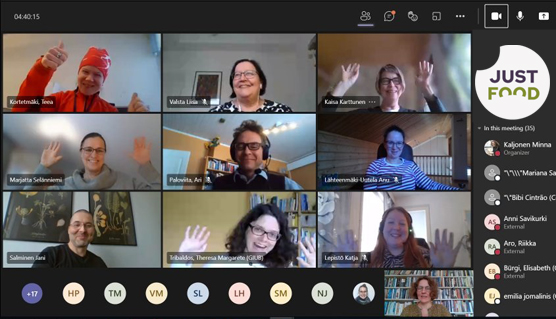
The fourth consortium meeting of the Just food project brought project participants together to discuss the impact of the project, among other topics. Everyone missed in-person interaction and corridor discussions! © Minna Kaljonen
Just food is a major project consortium, which has several ongoing work packages, with a lot going on in each of the packages. It is important that the working groups also interact and contemplate their different impact roles. In this way, we can ensure, in the best manner possible, that we all work together towards common goals and that the work yields the desired impact on society, both during the project and over a longer term.
One of this consortium meeting’s aims was to inspire discussion and interaction among experts. We carefully scrutinised what we had already achieved and recapped the goals set at the beginning of the project. To make sure that the outcome is not garbled, offering a little bit of something for everyone, it is important to discuss and think about the goals and place them clearly on a timeline.
“The discussion yielded good ideas. Sometimes you also need to be strategic to achieve as clear an outcome as possible,” says Head of Interaction Kaisa Karttunen.
“Impact must be considered more carefully, not just by counting the number of articles published or media hits”
Another important point of view is the impact of the project. The work carried out in the project is significant and that is why we want the information produced and the way it is produced to help decision-makers make wise decisions. In the consortium meeting, we discussed what kinds of different roles we as researchers and food transition experts could have in addition to the traditional role of an information distributor. How could we provide consultation to or engage food policy decision-makers, act as a partner for food industry operators or make it possible for vulnerable groups to be heard?
“The project conducts high-quality research and publishes several good articles, but the publication of articles alone is not enough to ensure that research has impact. We must think about, with a long-term perspective, how to engage different parties in different stages of research and how to communicate research results,” says Minna Kaljonen, Research Professor and Principal investigator of the project.
The project consortium members found the discussion very useful. Now that the project has continued for 18 months and the modelling of diets and the climate effects of consumption, for instance, has already proceeded far in the work packages, links can clearly be seen between the packages. For many, the contemplation of roles, target groups and measures served as an eye-opener and it was jointly decided that impact should be discussed in the future, too.
Next, the project’s interaction and communications concentrate on things such as creating the second Policy Brief, publishing blogs, podcasts and other publications for identified target groups and participating in different seminars, online for the time being. In the Just food project, the coronavirus pandemic has significantly complicated field research and intra-project interaction, for instance, but the work goes on regardless!
The JUST FOOD project is funded by the Strategic Research Council (SRC) of the Academy of Finland and is part of the six-year FOOD programme (2019–2025). The project is being coordinated by the Finnish Environment Institute (SYKE), and the cross-disciplinary project consortium also includes the University of Jyväskylä, e2 Research, Natural Resources Institute Finland (Luke), the Finnish Institute for Health and Welfare (THL), and the Centre for Development and Environment of the University of Bern, Switzerland.
More information
- Principal Investigator of Just food project Minna Kaljonen, Finnish Environment Institute SYKE, firstname.lastname@syke.fi
- Head of Interaction of Just food project Kaisa Karttunen, e2 Research, firstname.lastname@e2.fi